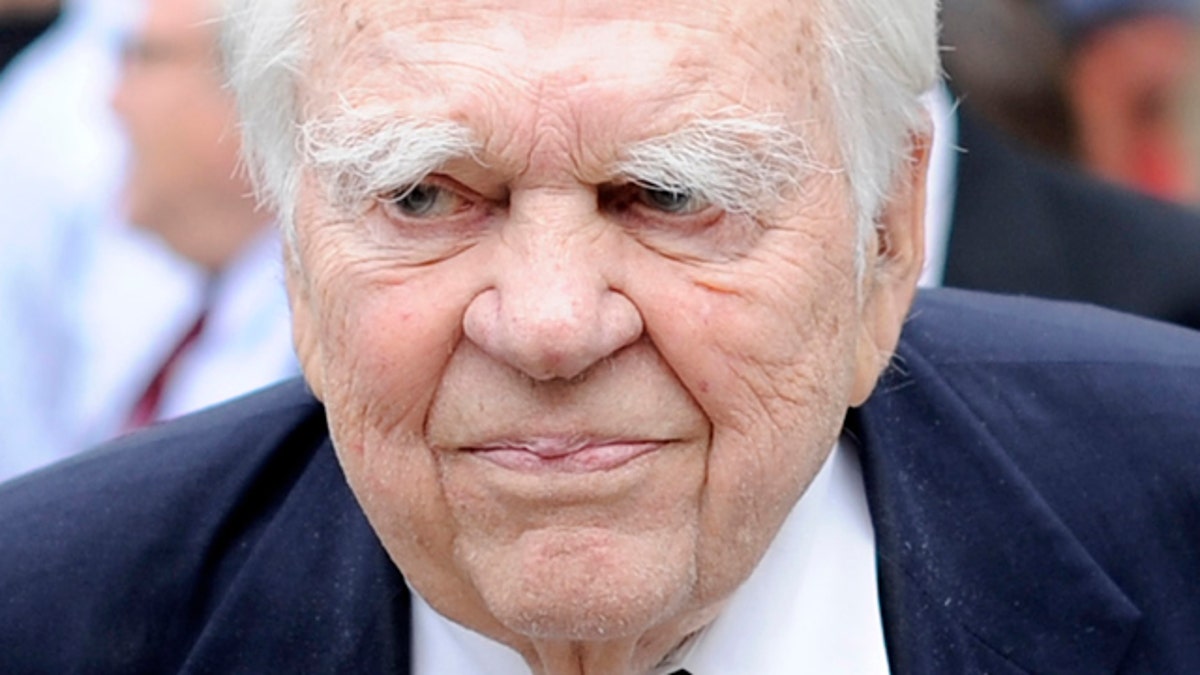
FILE - Aug. 9, 2009: "60 Minutes" commentator Andy Rooney, center, leaves the Celebration of Life Memorial ceremony for Walter Cronkite at Avery Fisher Hall in New York. (AP)
NEW YORK – With 1,096 essays for "60 Minutes" under his belt, Andy Rooney will deliver his 1,097th on Sunday's broadcast. And it will be his last as a regular contributor.
The 92-year-old Rooney will announce his departure at the end of the program, where he has been featured since 1978, CBS News announced on Tuesday. It will be preceded by a segment in which Rooney looks back on his career with "60 Minutes" correspondent Morley Safer.
"There's nobody like Andy and there never will be," said Jeff Fager, chairman of CBS News and "60 Minutes" executive producer.
He called Rooney's contributions to the program "immeasurable," and added, "It's harder for him to do it every week, but he will always have the ability to speak his mind on '60 Minutes' when the urge hits him."
Rooney began speaking his mind on "60 Minutes" in July 1978 with an essay about misleading reporting of automobile fatalities on the Independence Day weekend.
"Car for car," argued Rooney, "it's one of the safest weekends of the year to be going someplace." In fact, fewer people die of all causes on that weekend than at most other times, his research told him. And since "fewer people are watching television over the Fourth," he added, "I suppose fewer die of boredom."
He was a tender 59 years old, and, that fall, he became a regular contributor, delivering sometimes folksy, sometimes peppery observations on ordinary life under the title, "A Few Minutes With Andy Rooney."
Rooney had been a contributor to "60 Minutes" since the show's debut. During its first season in 1968 he appeared a few times in silhouette with Palmer Williams, "60 Minutes" senior producer, in a short-lived segment called "Ipso and Facto."
He also produced "60 Minutes" segments during the broadcast's first few seasons.
Rooney joined CBS in 1949 as a writer for "Arthur Godfrey's Talent Scouts," a hit show of that day. He also wrote for "The Garry Moore Show" (1959-65), a popular variety show. At the same time, he was writing for CBS News public-affairs broadcasts such as "The Twentieth Century" and "Calendar."
He wrote his first television essay in 1964, "An Essay on Doors." Continuing the collaboration with CBS News correspondent Harry Reasoner as on-camera narrator, Rooney composed contemplations on such subjects as bridges, chairs and women.
With "An Essay on War," which aired on PBS in 1971, Rooney made his first appearance delivering his words.
But his skills as a writer and producer, not as the talking head he also famously became late in life, were the roles he said he always valued most.
"I obviously have a knack for getting on paper what a lot of people have thought and didn't realize they thought," he reflected in an interview with The Associated Press in 1998. "And they say, `Hey, yeah!' And they like that."






